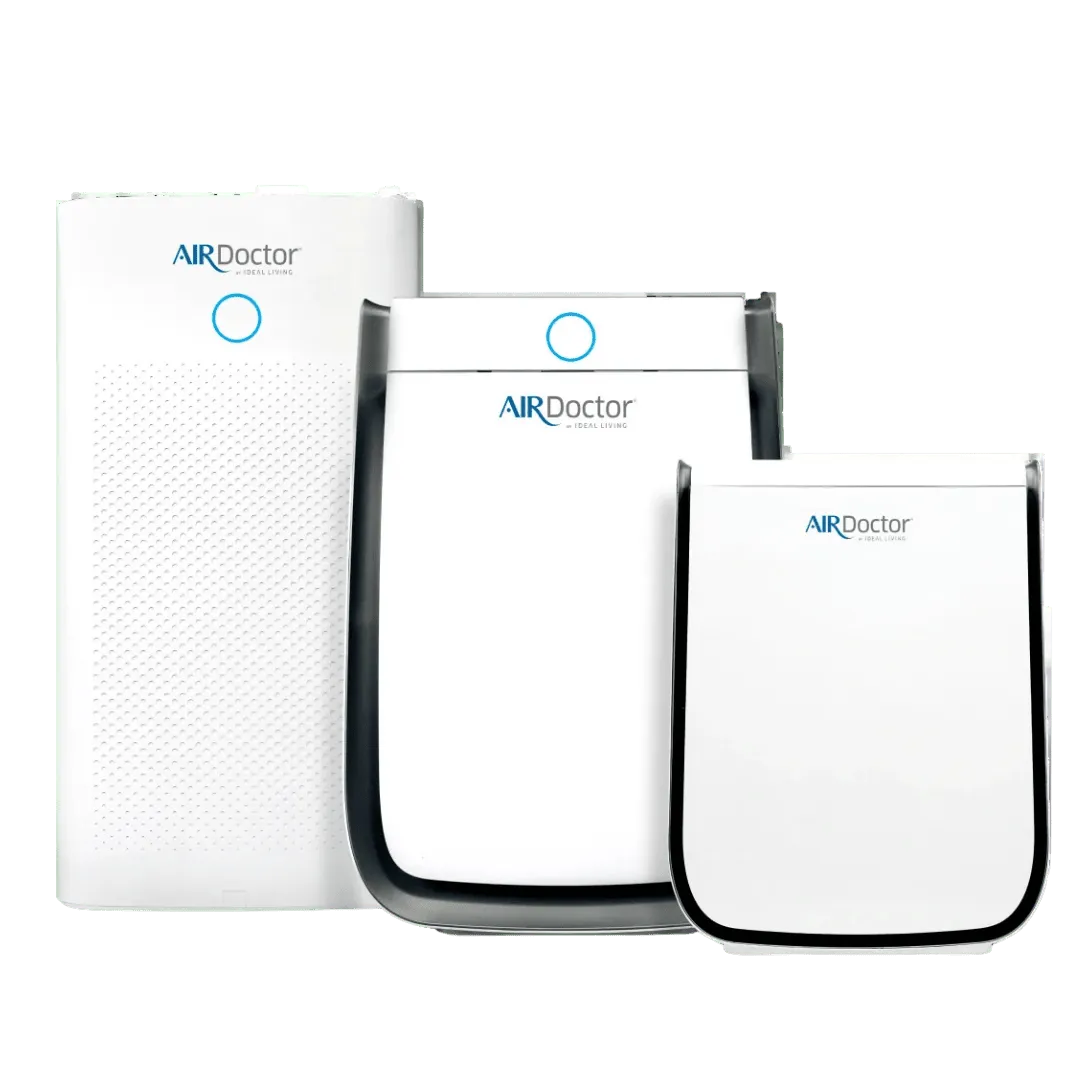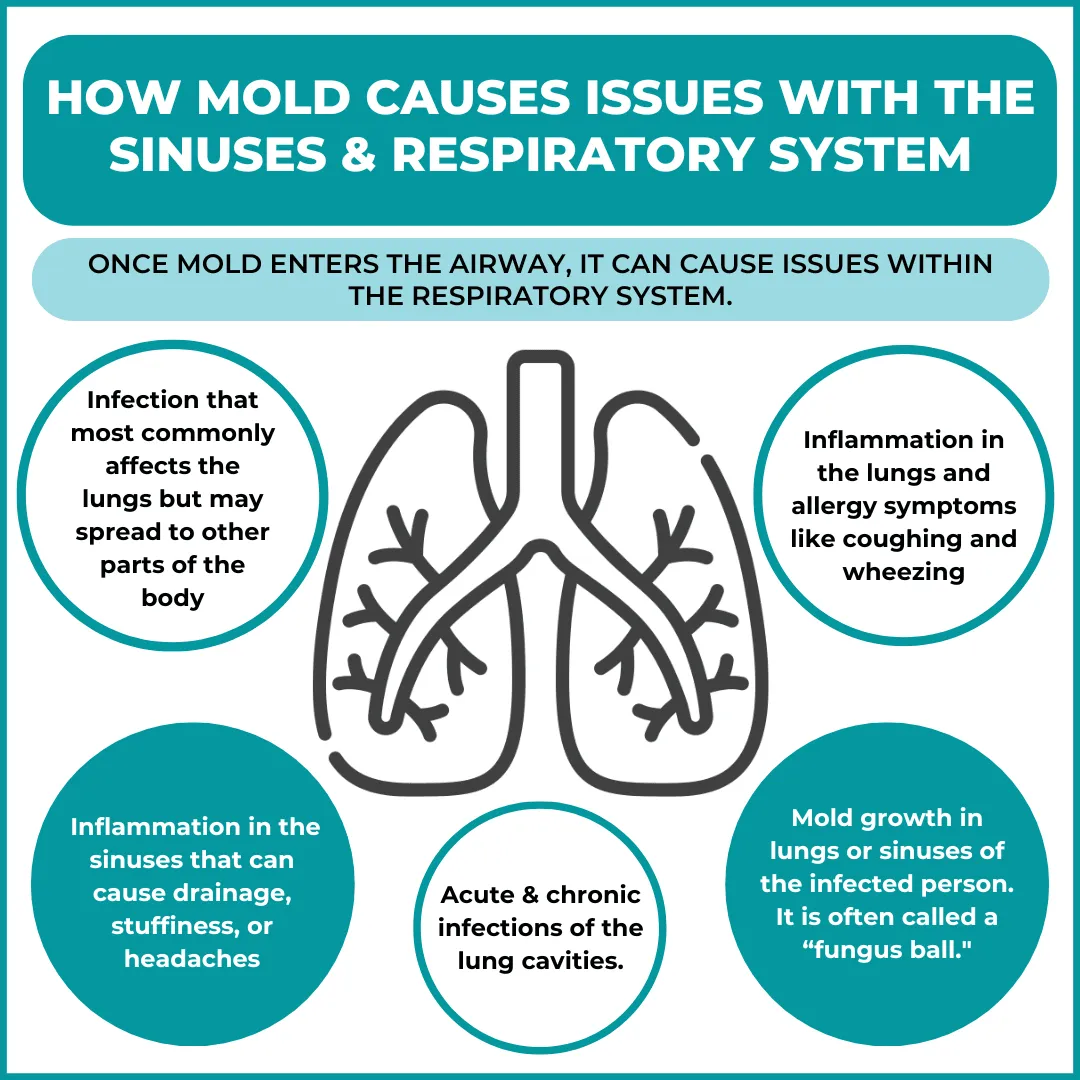

Smart Air Purifiers
Connected Capabilities
UltraHEPA Filter
Dual Action Carbon/Gas Trap/Voc Filter
Auto-Mode & AirQuality Sensor
Sealed System
Change Filter Alert
Quiet Performance



"I work with clients every day who struggle with all kinds of chronic illnesses. Many times it's extremely important to clean up their environment to remove things that may be contributing to their illness. That means removing mold spores, bacteria, viruses, etc.. That's where the AirDoctor comes in. I recommend the AirDoctor to many of my clients because it's a simple, easy step to a cleaner and safer environment." - Dr. Jaban
Do you struggle with any of these symptoms?



Why does my air need to be purified?
We all have things floating in our homes that can wreak havoc on our bodies. If you're noticing that you're having strange symptoms or if your home has an odd smell, you may want to invest in an AirDoctor.
The AirDoctor Removes:
Smoke
Bacteria
Viruses
Pet Dander
Pollen
Mold Spores

How Does it Work?
AirDoctor’s cutting-edge UltraHEPA filter captures 99.99% of airborne particles as small as 0.003 microns in size (like mold, pollen, pet dander, bacteria and viruses). That’s 100 times smaller than the HEPA standard. Additionally, AirDoctor’s Carbon Trap/VOC eliminates dangerous ozone, odors, gases, and volatile organic compounds (VOCs) like formaldehyde.
Connected Capabilities
UltraHEPA Filter
Dual Action Carbon/Gas Trap/Voc Filter
Auto-Mode & Air Quality Sensor
Sealed System
Change Filter Alert
Quiet Performance
Frequently Asked Questions
Why do I need an AirDoctor in addition to my HVAC filter?
Someone might want an AirDoctor filter in addition to their HVAC filter to achieve superior air purification and enhanced indoor air quality. While standard HVAC filters primarily capture large particulate matter such as dust, pollen, and pet dander, the AirDoctor filter uses a combination of UltraHEPA and activated carbon filters to remove 99.97% of particles as small as 0.003 microns, as well as volatile organic compounds (VOCs), odors, and toxic gases. This advanced filtration system addresses both particulate and gaseous pollutants more effectively than typical HVAC filters alone. By adding an AirDoctor filter, individuals can ensure a more comprehensive approach to eliminating airborne contaminants, resulting in a healthier living environment, especially for those with allergies, asthma, or sensitivities to chemical pollutants.
What's the difference between HEPA filters and Carbon filters?
HEPA, or High-Efficiency Particulate Air, filters are known for their ability to capture microscopic particles with efficiency. They can trap 99.97% of particles as small as 0.3 microns. This includes dust, pollen, pet dander, and mold spores, making them a valuable asset for allergy sufferers and anyone concerned about indoor air quality. Advanced HEPA filters take filtration to the next level as they often capture even smaller particles than standard HEPA filters. This means even tinier pollutants and allergens are effectively captured from the air. Advanced HEPA filters provide unparalleled purification and relief for allergy sufferers.
While HEPA filters excel at capturing particulate matter, they may not be as effective at eliminating gasses, odors, and volatile organic compounds (VOCs. This is where carbon filters come into play. Activated carbon filters are highly porous with a large surface area. This allows them to absorb many gasses and odorous molecules, effectively neutralizing unpleasant smells and harmful chemicals.
In conclusion, while both advanced HEPA filters and carbon filters play vital roles in air purification, combining the two offers the best of both worlds. With exceptional particle removal and superior odor control, AirDoctor’s 3 stage filtration remains unparalleled. With AirDoctor, you can breathe easy knowing that your indoor air is free of allergens, harmful gasses and unpleasant odors. Therefore, creating a healthier and more comfortable living environment for you and your loved ones.
https://airdoctorpro.com/lets-clear-the-air-understanding-hepa-filters-vs-carbon-filters/
Why are air changes per hour (ACH) important when shopping for an air purifier?
If you’re not moving the air, you’re not cleaning the air. Experts recommend at least 4 air changes per hour for optimal removal of airborne particles from the air. You can rest assured that AirDoctor purifiers are powerful enough to clean the air 4 times per hour, or every 15 minutes, for their respective room size coverage to deliver you pure, protected air. Many air purifiers base their room size coverage on only 1-2 air changes per hour (ACH). It is important to check that an air purifier has a high enough CADR to circulate the air in the room at least four times per hour.
What is CADR?
CADR stands for Clean Air Delivery Rate. CADR helps tell you how much of a particular contaminant is removed from the air within a specific period of time, and it creates an objective rating that allows consumers to compare one air purifier to another based on standardized testing. There are 3 pollutants that CADR measures, which are representative of different size particles, and they are: POLLEN, which represents larger particles (20 microns); DUST, which represents medium sized particles (5 microns); and SMOKE, which represents some of the smallest particles (0.1-1 microns). Since CADR represents the filtered airflow, this can be translated to understand square footage for a room size to be cleaned as well as necessary air changes per hour. The higher the CADR numbers, the better the overall ability of the unit to clean your indoor air and the faster the air in the room will be cleaned. You want to be most concerned with the smoke CADR number since that rating represents the removal of the smallest and most dangerous particles.
Do AirDoctor purifiers capture COVID-19?
AirDoctor’s UltraHEPA air purification technology was independently tested and shown to remove 99.97% of live airborne SARS-CoV-2 (COVID-19) from the air. These successful results were achieved using the live aerosolized SARS-CoV-2 virus on the AirDoctor 3000 purifier in a test chamber and conducted by U.S.-based MRIGlobal, an independent, not-for-profit contract research organization.These results built on AirDoctor’s previous independent laboratory testing that showed AirDoctor purifiers remove a variety of bacteria and viruses, including H1N1 influenza, and airborne particles as small as 0.003 microns.AirDoctor is not proven to kill or prevent transmission of SARS-CoV-2 (COVID-19). AirDoctor recommends using PPE & following directions of the CDC & other government authorities.
How do I know what size to get?
AirDoctor 1000
Our compact AirDoctor 1000 purifies the air in smaller spaces like a guest bedroom, kid’s room or office, changing the air in up to 285 square feet 4 times per hour, or every 15 minutes.
AirDoctor 2000/2000i:
Smaller and cuter version of the AirDoctor 3000, the AirDoctor 2000/2000i perfect for small living rooms, medium/small bedrooms, nurseries, home offices and more. Circulates the air in a 305 square feet room four times per hour, or every 15 minutes.
AirDoctor 3500/3500i:
Our classic AirDoctor 3500/3500i cleans the air in large spaces like master bedrooms, living rooms, kitchens and more, changing the air in up to 638 square feet four times per hour, or every 15 minutes.
AirDoctor 5500/5500i:
AirDoctor 5500/5500i can tackle the contaminants in extra-large spaces like open concept living rooms and high ceiling great rooms, changing the air in up to 1,001 square feet 4 times per hour, or every 15 minutes.
How often do I need to change the filters?
AirDoctor 1000: Based on 24/7 usage, the UltraHEPA® filter and Carbon/VOC filter in AirDoctor 1000 both need to be replaced approximately every 6 months. We recommend changing your filters whenever your Change Filter Alert indicator light signals for a filter replacement.AirDoctor 2000: Based on 24/7 operation, the Carbon/VOC filter should be replaced every 6 months and the UltraHEPA® filter should be replaced every 12 months. We recommend replacing filters when your Filter Change Alert indicator light signals for a filter replacement.AirDoctor 3000/3500: Based on 24/7 operation, the Carbon/VOC filter should be replaced every 6 months and the UltraHEPA® filter should be replaced every 12 months. We recommend replacing filters when your Filter Change Alert indicator light signals for a filter replacement.AirDoctor 5000/5500: Based on 24/7 operation, the Carbon/VOC filter should be replaced every 6 months and the UltraHEPA® filter should be replaced every 12 months. We recommend replacing filters when your Filter Change Alert indicator light signals for a filter replacement.
What is your return policy?
Try AirDoctor in your home for 30 days with our Breathe Easy Guarantee. If you do not love it, simply contact us to return the product and receive a full refund of your purchase price, less shipping and processing. No questions asked.
Do you offer payment plans?
Yes, we’ve partnered with Affirm, so if you’re interested in a payment plan option, just select the Affirm payment option at checkout and follow the instructions. Various purchase plans are available based on approval. Regretfully, Affirm is NOT available in Iowa or West Virginia due to state-specific financial regulations.
Do I need a dehumidifier and an air purifier?
The answer is, it depends. The need for both dehumidifiers and air purifiers is dependent on the specific conditions of your living space. If you reside in a humid climate or have persistent moisture issues, a dehumidifier is a wise investment to prevent mold growth and maintain a comfortable atmosphere. However, for comprehensive air quality improvement, an air purifier is essential.While dehumidifiers address the moisture concern, they may not effectively capture airborne particles such as mold spores. Air purifiers, on the other hand, focus on capturing these pollutants but may not impact humidity levels. Every home can benefit greatly from an air purifier, but a dehumidifier is not always necessary. If your home does struggle with moisture excess, then combining both appliances can create a synergistic effect, ensuring a balanced and overall healthy indoor environment.
https://airdoctorpro.com/dehumidifiers-vs-air-purifiers-do-you-need-both/
Can I use my FSA or HSA card for an Air Doctor Purifier?
Understanding FSA And HSA
Before delving into the details, let’s grasp the basics of FSA and HSA. Both are tax-advantaged savings accounts that help individuals cover qualified medical expenses. So what are the differences between the two?
An FSA is an employer-sponsored account that allows you to set aside a portion of your pre-tax income to cover medical expenses. The funds in this account must be used within the plan year. Please note that any unused amount may be forfeited. On the other hand, an HSA is a savings account for people with high-deductible health plans. Contributions to an HSA are tax-deductible, and the funds roll over from year to year. Additionally, HSAs are portable, meaning that you can keep the account and its funds even if you change employers or health plans.
The AirDoctor Advantage
Air purifiers have become indispensable for those seeking cleaner and healthier indoor air. AirDoctor is a leader in the air purification industry as it captures 99.99% of particles. This includes airborne particles such as pollen, mold spores, bacteria and viruses. The good news is that the IRS recognizes the importance of maintaining a healthy living environment, and air purifiers can be considered eligible expenses under FSA or HSA.
Eligibility Criteria
To maximize the benefits of your FSA or HSA, it’s crucial to understand the eligibility criteria for purchasing an air purifier. Generally, for these accounts to cover the cost, the air purifier must be prescribed by a medical professional for a specific health condition, like asthma or allergies. Please consult with your healthcare provider to determine if the purchase of an AirDoctor qualifies for your unique situation.
How To Make It Happen
Consult Your Healthcare Provider: Schedule an appointment with your healthcare provider to discuss your respiratory health and the potential benefits of using an air purifier, such as AirDoctor. If your provider deems it necessary for your well-being, they can prescribe an air purifier.
Keep Documentation: Documentation is key when using FSA or HSA funds. Obtain a written prescription from your healthcare provider specifying the need for an air purifier to address your health condition.
Purchase an AirDoctor: With prescription in hand, ensure that AirDoctor meets the eligibility criteria outlined by your healthcare provider. Make sure to keep all receipts and documentation related to the purchase.
Submit Reimbursement Claim: After purchasing the air purifier, submit a reimbursement claim to your FSA or HSA provider. Include all necessary documentation, such as the prescription and receipts, to support your claim.
Conclusion
The quest for a free AirDoctor through FSA or HSA is not completely painless. It involves careful planning, consultation with healthcare professionals, and adherence to eligibility criteria. By taking these steps, you can improve your indoor air quality and enjoy the benefits of a cleaner and healthier living space without breaking the bank. By making the most of your health-related savings accounts, you can breathe easy in a fresher and more comfortable home environment.
Skip the Line: Book with Dr. Emily M.D. $199

Dr. Emily Kucera is a medical doctor with almost 30 years of experience in pediatric radiology. She transitioned from standard of care to functional medicine and clinical nutrition beginning in 2020, in order to find new possibilities for patients and better serve their needs. She earned her certification as a functional medical provider from the Institute of Functional Medicine (IFM) and, in addition, became certified as a clinical nutritionist from the IAACN. Throughout her journey in functional medicine, Dr. Kucera learned the importance of treating the “whole” person as opposed to treating symptoms. Dr. Emily is very well-versed in the many complex cases we work with but especially loves working with infertility & autoimmune cases!
New Client Appointment: $350 For a limited time we are offering a 43% discount! $199Follow Up Appointments with Dr. Emily : $90Lab Interpretation with Dr. Emily: $180
If you have labs that you want reviewed in depth, please contact our office to schedule additional time.Email [email protected]
Not sure who you want to work with? Book a FREE discovery call!

Our New Client Advisor will give you a call at your appointment time. During this appointment, you can discuss in depth the different physicians we have in the office, how to schedule, as well as how we work with our clients! After scheduling your appointment, you can also visit our FAQ page on our website to get any of your preliminary questions answered. We look forward to your upcoming appointment and finding the perfect doctor for you!

Get Yours Today!




